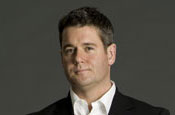Open the big book of celebrity endorsement scandals, it's time to make another entry. Swimming star Michael Phelps was just having a bit of fun last November while visiting his girlfriend at the University of South Carolina when, along with all the shots and beer he consumed at a house party that weekend, he also had a toke on a bong that was being freely passed around.
Phelps had probably forgotten all about this weekend until the photo of his bong hit appeared on the cover of the News of the World last weekend.
The reaction was immediate. USA Swimming banned Phelps from competition for three months and the media reported that his lucrative sponsorship deals would almost certainly dry up.
That prediction came true as Kellogg announced it would not renew its tie-up with the star. The reaction of Kevin Adler, founder of Chicago sports marketing firm Engage Marketing, was typical of the expert commentators. 'Athletes are brands. If you do something that runs contrary to your brand image, it will affect your ability to monetise that brand image. It really is that simple,' he concluded.
No, it really is not that simple. For starters, Phelps is not a brand. He is an athlete who, through association with brands, can confer meaning. People,
no matter how famous, are not brands. Yes, they have symbolic meaning, but so do road signs and mythological gods, and no one is confusing them with brands.
It would also be a mistake to assume that Phelps' actions will damage his reputation. Outside of the pool, he is just an average 23-year-old kid from Baltimore. One of the joys of his victories in Beijing was the laid-back and normal manner in which he handled himself. I spent many of my formative years at US universities, and bongs were pretty much the norm at every party. Smoking a bong at a college party confirms, rather than contradicts, Phelps' everyday image.
If we know anything about celebrities, it is that they often go off the rails only to reemerge after a period of reflection, bigger and more endorsable than ever. It was only a year ago that Britney Spears was committed to a psychiatric hospital, but her latest video, for the song Circus, shows her decked in Bulgari jewellery as part of a multimillion-dollar endorsement.
Celebrities screw up, but the effects are usually temporary. Indeed, in many cases, screw-ups and the recovery that follow may well increase the attractiveness of the celebrity for future endorsement by adding notoriety and a fighting spirit to their allure.
Phelps is a case in point. What none of the media reported last week was that after he won six gold medals in Athens in 2004 he went home and was charged with drunk driving - a far more serious crime than pot-smoking. The scandal did not harm his appeal four years later in Beijing, and this latest minor infraction is equally unlikely to have much long-term impact.
In truth, even the short-term implications of Phelps' actions are not materialising. Aside from Kellogg, his major sponsors such as Hilton, Omega and Subway are standing by their man. In any case, Kellogg's condemnation is hardly a major blow. It had a six-month contract with the star that was coming to an end. Severing its endorsement a few days early in such a public manner was simply a smart (and, arguably, cynical) way of generating positive PR.
So let's close the book on Phelps. He can get back in the pool and we will see him next in London - covered in gold medals and in a sea of sponsorships.
Mark Ritson is an associate professor of marketing and consultant to some of the world's leading brands
30 seconds on celebrity endorsements gone wrong
- High-profile luxury brands including Burberry, Chanel and H&M, rushed to end their tie-ups with Kate Moss after the super-model was photographed allegedly taking cocaine in 2005. Rimmel retained Moss, despite rumours it would drop her for a younger model.
- Former NFL star OJ Simpson was a spokesman for Hertz rental cars for decades from 1972-1992. The brand terminated the sponsorship when reports of domestic abuse culminated in Simpson being charged with the murder of his former wife.
- Alcohol brand Seagram's dropped Bruce Willis as the face of its TV campaigns when the star was arrested for drunk driving in 1987.
- Pepsi paid Michael Jackson $700,000 ($1.4m in today's money) in 1984 to star in three commercials. While film-ing, a smoke bomb explo-ded two feet from Jackson's head and set his Jheri-curled hair alight. The star was rushed to hospital in an ambulance, which he later claimed was 'one of those things [he] had always wanted to do'.


